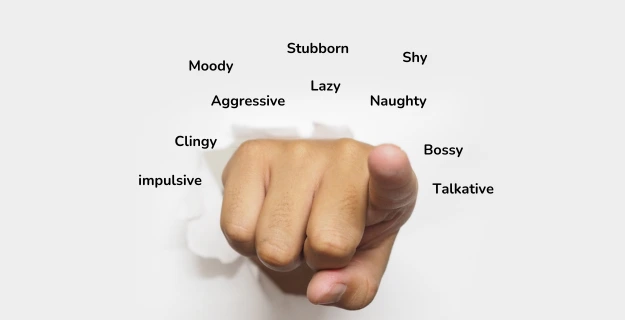Words are potent. Good words and not so good words fiercely penetrate through the body, mind and soul leaving significant impacts in the way humans act, think or feel. Now imagine the everlasting impact it leaves on children. Much of parenting is one eyed perspective, the parenting type and methods could be the ones that make the life of a parent easier. Rarely child-centric.
The world accepts people following norms. These norms define the ways in which one should appear, behave and think. For children, it is technically difficult to adapt to these predefined social norms.
A slight deviation in the behaviour ends in harmful labelling! Along with diagnostic labels such as ‘autistic’ or ‘hyperactive’, the labels that cause harm are also the ones that erupt from casual and momentary observations. They are subjective in nature, detrimental and damaging.
Unfortunately, repetitive labeling of a child as ‘lazy, slow..’ and ‘intelligent, brave’ leave the same everlasting impact. Labeling is like the devil and the deep sea! Understanding the impact of labelling here, is the key.
Why does labelling happen anyway?
Labelling could be an immediate reaction that conveys ‘I am upset’, possibly due to failure in following the set behaviour norms. Labelling attempts are made to resolve or target a concerning behaviour. Sometimes, labelling is used to encourage acceptable behaviour. Clearly, labelling attempts are unfair methods to impose certain behaviours on children. Mostly it could be a process of insinuating that the child may have either a bright future or the worst ever! It makes the life of a stakeholder easier. The reactions are strong emotional outbursts.
Labeling hurts! Why not to label?
Labels are subjective, keep changing and can go out of date, children evolve with time. A diffident child can grow into a confident adult. A gregarious teenager can become an introverted adult. If parents are triggered by certain behaviors of children, it is vital to deal with their tricky emotions first! Concerning behaviors could be addressed in varied different ways rather than labeling. Labels serve no purpose, in situations where a negative label is used persistently, it may result in stigmatization, further behavioral complications and poor self esteem. Labeling affects the sense of self.
How to undo it and what to do?
The good news is you can gradually reduce labelling as a behaviour. It starts with being mindful of your reactions, the way you communicate with children and the way you model behaviours.
1. Always talk about ‘specific behaviour’ rather than targeting an entire personality.
Avoid saying, “You are always naughty. You do this all the time”, say “What happened today? You broke your brother’s toy. I want you to help him fix it.” Refrain from using the word “always”; instead focus on the specific behaviour and avoid generalizing it for a lifetime. It isn’t really about the child as a whole, it is about a specific behaviour that is surrounded by reactions and situations.
2. Analyse the situation, circumstances and not the child!
Allot some time to pause and reflect before fiercely responding. It is necessary to quickly run through an analysis of what could be the motivation behind a specific behaviour? What is the message and what are they trying to communicate? Mostly, behaviours are strong pieces of information, which needs some quick decoding and processing. Your reactions may be unsuitable.
3. Shift perspectives, yes it’s possible!
Look around for all possible ‘why’s’ rather than continuing with one common traditional perspective. Every behaviour is unique, every action is for a reason, every act is situation specific. Identify the triggers, simply go above and beyond, be creative in your analysis. There could be many versions!
4. Work on yourself!
Parenting is hard! You may hit rock bottom once, twice or many times. Identify what triggers you, evaluate the norms you have established for your children. Be open to accept the uniqueness in every behaviour. A child is made of the experiences around him/her. They build an understanding of life through you. It is vital to anchor them wisely, leaving behind meaningful traces.
Be mindful. Let children be. Use words. Pause. Reflect. Respond.



